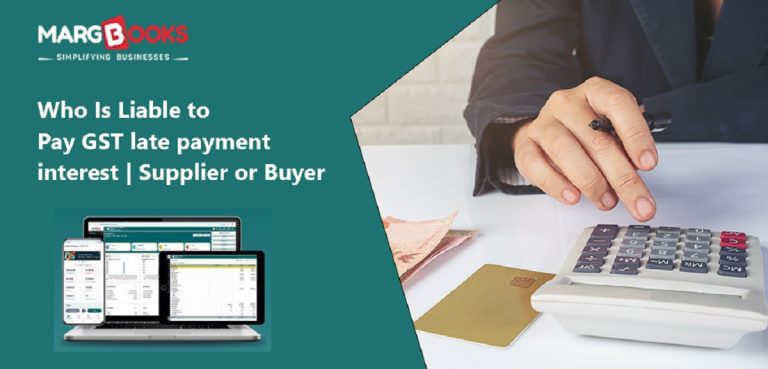In the world of business, timely compliance with tax regulations is crucial. One such important compliance under the GST (Goods and Services Tax) regime in India is the timely payment of tax liabilities. But what happens when there’s a delay? Who ends up paying the GST late payment interest is it the supplier or the buyer? This is a common question that confuses many, especially small business owners and startups.
Let’s break it down in simple terms, so by the end of this article, you’ll have clarity on not just the responsibility, but also how you can avoid such penalties altogether with the right tools, Online GST Billing Software, and Accounting Management Software such as MargBooks.
Understanding GST Late Payment Interest
The GST late payment interest is a penalty levied by the government when a registered taxpayer fails to pay their GST dues within the prescribed time. According to GST law, the interest rate for delayed payment of GST is:
- 18% per annum for delay in payment of tax
- 24% per annum in case of undue or excess claim of input tax credit or reduction in output tax liability
Interest is calculated from the day following the due date of payment till the actual date of payment.
Who Is Liable to Pay?
Let’s come to the core question Who is liable to pay GST late payment interest – the supplier or the buyer?
Responsibility Lies with the Supplier
Under the GST regime, the supplier is primarily responsible for charging, collecting, and remitting GST to the government. Once the invoice is raised and the goods or services are supplied through our online GST billing software, it becomes the supplier’s duty to pay the tax, irrespective of whether they’ve received payment from the buyer or not.
If the supplier delays filing their GSTR-3B return or delays in paying the GST collected from customers, then the supplier is liable to pay interest on the late payment.
Buyer’s Role is Limited
The buyer is not directly responsible for filing GST returns on behalf of the supplier. However, the buyer may be affected indirectly in cases where the supplier fails to comply. For instance:
- The buyer may not be able to claim Input Tax Credit (ITC) if the supplier hasn’t filed returns properly.
- Business relationships may strain if suppliers start demanding late interest charges from buyers.
But legally, the government holds the supplier accountable, not the buyer.
When Can the Buyer Be Affected?
Although the buyer isn’t liable to the government, there may be situations where contracts or agreements between the buyer and supplier shift the financial burden of late payments. For example:
- If there’s a contractual clause that states the buyer must compensate the supplier for any losses due to delayed payment, the supplier might pass on the interest cost.
- Delayed payments from the buyer could indirectly force the supplier into default, making it a commercial issue rather than a legal one.
Hence, it’s always advisable for businesses to clearly define payment terms and GST responsibilities in their contracts.
Why is GST Compliance Crucial?
Let’s be honest—no one likes penalties, especially when they can be easily avoided. Paying interest on late GST payments not only affects your cash flow but can also invite unnecessary scrutiny from tax authorities.
Here are a few reasons why GST compliance should be a top priority:
- Avoid Financial Losses: Late interest payments can pile up quickly.
- Maintain Credibility: Suppliers and buyers are more likely to trust compliant businesses.
- Smooth ITC Claims: Timely filing ensures your buyers can claim their input credit without hassle.
How to Stay Compliant – Let Technology Help You
The easiest and most efficient way to stay compliant is by using smart software solutions.
Online GST Billing Software
Software such as MargBooks allows you to generate GST-compliant invoices, file returns directly from the system, and calculate your GST liabilities in real-time, all through our online GST billing software. The features are as follows:
- Automatic GST calculation
- GSTR-1, GSTR-3B preparation
- E-invoice generation and e-way bill integration
Accounting Management Software
Whether you’re managing a small retail shop or a full-scale enterprise, using a robust accounting management software helps you keep a real-time track of:
- Payables and receivables
- Due dates for GST returns
- Automated alerts for compliance deadlines
MargBooks combines the best of both worlds, billing and accounting, into a single platform. It ensures you never miss a due date, thereby avoiding penalties and interest payments.
Final Thoughts
To wrap it up, the responsibility of paying GST late payment interest lies with the supplier, not the buyer. While buyers might indirectly influence the situation through delayed payments, the onus remains legally and financially on the supplier.
The good news? With tools like MargBooks, businesses can completely avoid this confusion and stay 100% compliant with minimal effort. So if you’re tired of juggling deadlines, paperwork, and compliance pressure, it might be time to embrace smart tech.
Stay compliant. Stay stress-free. Let MargBooks handle the complexity of GST for you.




